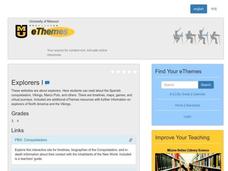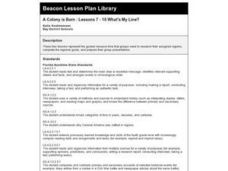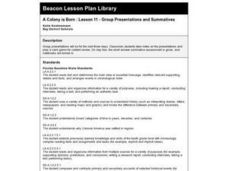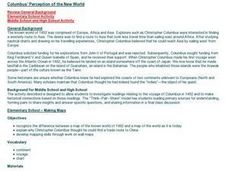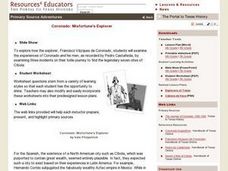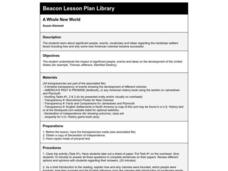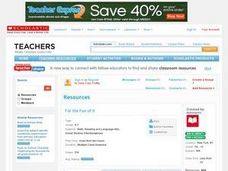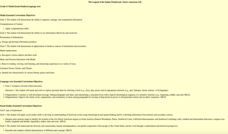Curated OER
United States & Canada: How Are We The Same? How Are We Different?
Students compare and contrast similarities and differences between Canada and the US. In this geography lesson, students read various articles and identify similarities and differences in economies, cultures, geography, climate,...
Curated OER
Explorers
Students search interactive sites to discover the history of exploration. They inspect an explorers' timeline and read about them. They participate in a Viking quest game and a multimedia recreation of Marco Polo's explorations.
Curated OER
A Colony is Born : Lesson 4 - What Went Wrong?
Fifth graders compare and contrast two early colonies and make a T chart. They list examples of worked well and what did not, and significant historical events. They use higher order thinking skills by deducing how different scenarios...
Curated OER
A Colony is Born : Lessons 7 - 10 What's My Line?
Fifth graders research their assigned regions, complete regional guide and prepare presentations about the New World colonists. They refer to "Everyday LIfe: Colonial Times" as well as searching marked internet sites.
Curated OER
A Colony is Born : Lesson 11 - Group Presentations and Summatives
Fifth graders give presentations on colonial research. The others take notes on the presentations. They play a card game which helps them review content. They take a summative assessment and present their research notebooks.
Curated OER
Book: Latinos Today: Facts and Figures
Students, after reading Chapter 1 in the book, "Latinos Today: Facts and Figures," identify and characterize the four main ethnic/racial groups in America. They calculate and design a bar graph showing their populations by their...
Curated OER
Columbus' Perception of the New World
students investigate readings relating to the voyage of Columbus in 1492 and to make historical connections based on those readings. They form pairs to share insights and answer specific questions, and share information in a final class...
Curated OER
Kids Count
Students read special purpose map, use place value to hundred thousands, and write numbers to hundred thousands.
Curated OER
Baltimoreans in the California Gold Rush
Eleventh graders explore the reasons for migration to California during the Gold Rush. In this American History lesson, 11th graders read letters about the opportunities and obstacles people faced. Students create a map of...
Curated OER
Slavery
Students trace the routes of escaping slaves on their journey north by calculating the mileage each one walked and define and use accurately the term Underground Railroad. They read The Drinking Gourd by Jeanetter Winter.
Curated OER
Coronado: Misfortune's Explorer
Fourth graders discuss the importance of Coronado's expedition through Texas and the trials his men endured during the journey. They view and discuss a map of Coronado's route, the effects of weather on the Great Plains, and Buffalo....
Curated OER
Lending a Helping Hand
Students research the work of North American NGOs and select one to support with a financial contribution as a class. In this philanthropic research lesson, students consider the work of Benjamin Franklin, defining good citizenship and...
Curated OER
A Colony is Born : Lesson 2 - Sez Who?
Second graders increase their baseline knowledge of primary and secondary sources and the likenesses and differences of them with regard to a selected historical event.
Curated OER
A Whole New World
Students examine a timeline of a sequence of events displaying how the colonies were founded. They analyze Jamestown and Plymouth recruitment posters, write journal entries, and play a Jeopardy game with questions about the colonies.
Curated OER
General Information on Accreted Terrane
Students use the Idaho Digital Atlas. They look at the map on the main page and determine where the coast of the Pacific Ocean was before the Jurassic time period and how the coast has moved from its previous position to its present...
Curated OER
Immigration in the Connecticut River Valley
Students discuss and compare immigration during the 18th century to the Connecticut River Valley to that in America during the turn of the century.
Curated OER
Africans in Mexico
Students read case studies to examine the role of Africans in Mexico. Using maps, they research the areas that are discussed in the text and map out movement maps of Africans to and from Africa. They research the history of the Mexico...
Curated OER
Mural Mania
Students create a mural that displays symbols for their home state. They complete worksheets and read a book about their state. They collect images of the state flower, tree and bird for the mural. There are 5 other lesson plans included...
Curated OER
Giving Generously
Students are read a book about giving. They discover that giving to others is rewarding. They also locate China on a map and make their own rice cakes.
Curated OER
Language Arts: Women in History
Students read excerpts from Amelia Earhart's autobiography, "The Fun if It," and identify her character traits. To aid visualization of her transatlantic flight, they search books and the Internet for photos related to Earhart's flights....
Curated OER
For the Fun of It
Middle schoolers investigate author's purpose in autobiography by reading Amelia Earhart's autobiography entitled The Fun of It. Learners examine character traits needed to fulfill personal goals.
Curated OER
NAFTA Trade Unit
Students research the geography, economics and government of Canada and how that affects US/Canadian trade relations. In this NAFTA lesson, students play a game, read about Canadian history, and creat a graph.
Curated OER
The Legend of the Indian Paintbrush: Native American Life
Students read," The Legend of the Indian Paintbrush" by Tomie dePaola and discuss the way legends are passed down orally. They then create their own legend and illustrate it on a simulated "Buffalo Skin" made from brown paper.
Curated OER
Colors Crackle, Colors Roar
First graders engage in a reading of poems in colorful language. They become with the interrelation of using Spanish and English words interchangeably in a text. The lesson also builds multicultural appreciation for young students.



